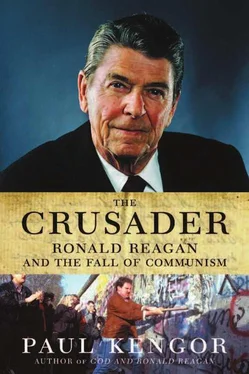There were other GE Theatre occasions where Reagan assumed political roles, most notably in a December 13, 1959 episode called “The House of Truth,” in which Reagan played a U.S. intelligence officer in an Asian village in which Communists burned down an American library. The officer not only helped reopen the library but countered the Communists. In yet another GE Theatre show, aired September 24, 1961, titled “The Iron Silence,” Reagan played a Soviet Major named Vasily Kirov during the occupation of Budapest. At the end of the episode, Kirov releases two Hungarians in his custody, telling them, “I never knew what freedom was until I saw you lose yours.” 9Reagan liked the line so much that he shared it years later when making a point in one of his 1970s radio broadcasts. 10
Chris Matthews, a former speechwriter for Democrats and now a popular pundit and TV host, recalls tuning in to GE Theatre one night as a kid and observing Reagan saying, “This is a program I care a lot about personally.” 11Matthews was referring to a two-part finale titled, “My Dark Days,” broadcast on March 18 and 25, 1962. Reagan starred as the husband of a housewife who was asked by a friend to attend a meeting of a liberal Los Angeles group called the Alien Protection Committee, which claimed that its purpose was to promote the advancement of foreign-born Americans. The housewife and the FBI suspected the group was a Communist front. She infiltrated the group and became an informant. The script was adapted by Richard Collins from Marion Miller’s autobiography, I Was a Spy: The Story of a Brave Housewife (Bobbs-Merrill, 1960). 12
Indeed this episode was deeply personal to Reagan, who, a few weeks after it aired, wrote a letter to two friends in which he spoke of the difficulties he faced trying to get the show produced. He complained that it was “near impossible” to “cram five years of espionage into thirty minutes.” But that was the least of his problems: “I had to fight right down to the wire to make the Communists villains,” said Reagan. “When I say ‘fight’ I really mean that.” The problem, explained Reagan, was that there were liberals on the producing staff who believed that Communist infiltration was a fantasy “dreamed up” by “right-wingers,” and as such they attempted to sabotage the show. Reagan was especially irate over the fact that two of the producers and one director tried to cut the scene in which a little girl said her prayers. “Finally in a near knock-down, drag-out,” wrote Reagan, “they admitted their objection was because they were atheists.” While Reagan was victorious in this battle, the company remained ignorant of his struggle to get the program produced. 13
EARLY 1960S—“WE ARE IN A WAR” AND “WE ARE LOSING”
During these later GE years, SAG once again became a part of Reagan’s life, as he returned to his role of union president in 1960 after an eight-year hiatus. Almost immediately after resuming this high-profile position, Reagan faced the difficult responsibility of negotiating a new general contract with the studios. Despite the complex nature of this hurdle, Reagan won. As a measure of his triumph, when he announced the strike-settlement package to a mass meeting of the membership on April 18, 1960, Reagan received a standing ovation and a landslide approval vote of 6,399 to 259. 14
As SAG president, Reagan found new venues for voicing his anti-Communist cause, and while he had labored hard to stymie the spread of Communism in Hollywood, he felt that the battle was far from over. In 1960, he boycotted a 20th Century-Fox banquet for Soviet Premier Nikita Khrushchev, and a few months later in May 1961 he asserted that Communists in Hollywood were “crawling out of the rocks.” To Reagan, the Communist Party had “ordered once again” a massive infiltration of TV and motion pictures. “We in Hollywood broke their power once,” Reagan rallied, “but it was only an isolated battle.” 15In the years since his absence from SAG, Reagan believed the Communists had once again gained a foothold in Hollywood and were again in the process of spreading their anti-democratic sentiment. “They are renewing in the spirit of Lenin’s maxim of two steps forward and one backward,” said the future president in July 1961. This particular Reagan clarion call was picked up by UPI in a story syndicated throughout the country. 16
Trying to convey the gravity of what was happening, he contended in another July 1961 speech that the “ideological struggle with Russia” was the “number one problem in the world.” In the same talk where he shared that thought, he raised the intensity, striking the notion of “war.” Offering his view of how America should react to the hazards of Communism, Reagan criticized those who “subscribe to a theory that we are at peace, and we must make no overt move which might endanger that peace.” He declared that “the inescapable truth” is that America is “at war,” and “we are losing that war simply because we don’t, or won’t realize that we are in it.” 17
Some deemed this rhetoric too bellicose, but Reagan felt that such candor was necessary. We may not, after all, think we’re at war, Reagan repeatedly told his GE Theatre soldiers, but the Communists certainly feel they’re at war with us. He assailed Communism’s aggressive and expansionary nature, and its expectation of inevitable conflict with the capitalist West:
Karl Marx established the cardinal principle that communism and capitalism cannot coexist in the world together. Our way of life, our system, must be totally destroyed; then the world Communist state will be erected on the ruins. In interpreting Marx, Lenin said, “It is inconceivable that the Soviet Republic should continue to exist for a long period side by side with imperialistic states. Ultimately, one or the other must conquer.”
Last November, the Communist parties of 81 countries held a convention in Moscow; and on December 6, reaffirmed this principle of war to the death. In a 20,000-word manifesto, they called on Communists in countries where there were non-Communist governments to be traitors and work for the destruction of their own governments by subversion and treason. 18
These were not the passive words of a cheerful Hollywood dinner speaker who came to chat about the Oscars. Moreover, much of this Reagan sentiment was candidly reiterated, reexplained, and redefended again and again. He harped on his points, and people that knew him, knew that this battle was at the heart of what he represented. Reagan was determined to make America see the very real threat that he believed Communism posed to the nation’s way of life. America could not afford to be lulled into complacency by the fact that no one was dying in this war. This was a war that he wanted to win.
Firmly established in his talks in 1961, this “war” rhetoric became a regular drumbeat by Reagan throughout 1962. He took that specific message from the heartland to the Badlands, from the plains to the mesas, writing and refining speeches that were designed to convince Americans of Communism’s manifold dangers. In Bartlesville, Oklahoma in February, he reminded a crowd that, “We are in a war, whether we admit it or not.” 19In two other stops in the final week of February, including at a press conference before a speech in Dallas, he made remarks such as “the free world is at war” with Communism and “the war isn’t over.” 20“The weapons in this war frequently are strange to us,” said the Crusader, “such as subversion, propaganda, and deliberate infiltration of many institutions of our free society.” Here, Reagan no doubt had Hollywood in mind. He went on: “The enemy has not resorted to the traditional instruments of war, partly because he has been doing so well without them.” He admonished, as he would in the 1980s: “Communism is a single, world-wide force dedicated to the destruction of our free-enterprise system and the creation of a World Socialist State. Communism is not a political party, it is a quasi-military conspiracy against our government.” 21
Читать дальше












